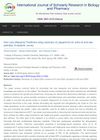 September 2022 in “Frontiers in Bioengineering and Biotechnology”
September 2022 in “Frontiers in Bioengineering and Biotechnology” Taxifolin from Rhododendron mucronulatum may help prevent hair loss and promote hair growth.
 June 2022 in “Journal of Experimental Biology and Agricultural Sciences”
June 2022 in “Journal of Experimental Biology and Agricultural Sciences” Higher testosterone harms sperm motility, while higher estradiol improves sperm survival.
 May 2022 in “bioRxiv (Cold Spring Harbor Laboratory)”
May 2022 in “bioRxiv (Cold Spring Harbor Laboratory)” The enzyme 5α-reductase is important for proper blood vessel development during the fertility-related transformation of the uterus lining.
 December 2020 in “Current Sexual Health Reports”
December 2020 in “Current Sexual Health Reports” Finasteride can have lasting negative effects on brain function and behavior by disrupting neurosteroid production.
July 2001 in “APMIS. Acta pathologica, microbiologica et immunologica Scandinavica./APMIS” Male children's genital development issues can be caused by genetic mutations or environmental factors affecting hormone action.
 February 1990 in “Journal of The American Academy of Dermatology”
February 1990 in “Journal of The American Academy of Dermatology” New skin treatments in 1987-1988 showed effectiveness for various conditions, but some had side effects or risks.
March 2023 in “International Journal of Molecular Sciences” ADSC-Exos with miR-122-5p can help treat hair loss by promoting hair growth.
August 2021 in “Asian Journal of Pharmaceutical and Clinical Research” Plant extracts in shampoo improved hair thickness and density in men with hair loss.
May 2020 in “International journal of molecular biology” Mutations in the AR gene cause hair thinning and loss.
 October 2012 in “Medical Hypotheses”
October 2012 in “Medical Hypotheses” Artemis dysfunction might cause hair loss through telomere shortening.
3 citations,
January 2023 in “Nutrients” Hordenine may help hair grow by activating a specific cell growth pathway.
 December 2023 in “European Journal of Pharmacology”
December 2023 in “European Journal of Pharmacology” C3G and Vitisin A may help prevent hair loss by blocking male hormones and stopping hair cell death.

Nanocarriers with plant extracts show promise for safe and effective hair growth treatment.
 12 citations,
October 2021 in “Cells”
12 citations,
October 2021 in “Cells” Targeting a protein that blocks hair growth with microRNAs could lead to new hair loss treatments, but more research is needed.
 7 citations,
March 2021 in “Evidence-based Complementary and Alternative Medicine”
7 citations,
March 2021 in “Evidence-based Complementary and Alternative Medicine” Nelumbinis Semen extract helps hair grow and could prevent hair loss.
3 citations,
December 2021 in “Frontiers in Pharmacology” Ficus benghalensis leaf extracts can effectively promote hair growth and inhibit hair loss.
 1 citations,
September 2023 in “Journal of cosmetic dermatology”
1 citations,
September 2023 in “Journal of cosmetic dermatology” Silybum marianum flower extract may help increase hair growth and decrease hair loss.
 June 2024 in “International journal of scholarly research in biology and pharmacy”
June 2024 in “International journal of scholarly research in biology and pharmacy” Most students believe rosemary oil, peppermint oil, amla oil, and saw palmetto can help with hair loss.
 May 2024 in “Food bioscience”
May 2024 in “Food bioscience” Wood sterol may help reduce hair loss caused by a high-fat diet.
February 2024 in “Cosmetics” The conclusion is that new plant-based treatments for hair loss may work by targeting certain enzymes.
 4 citations,
June 2021 in “Journal of Microbiology and Biotechnology”
4 citations,
June 2021 in “Journal of Microbiology and Biotechnology” Ginsenoside Rg4 from ginseng may help hair growth by activating certain cell signals.
1 citations,
December 2023 in “Biomolecules” Regulating cell death in hair follicles can help prevent hair loss and promote hair growth.
 1 citations,
December 2022 in “Current Issues in Molecular Biology”
1 citations,
December 2022 in “Current Issues in Molecular Biology” Annurca apple extract improved hair growth in mice and could potentially prevent hair loss.

Hair RiseTM microemulsion effectively promotes hair growth and treats hair loss better than standard treatments.
August 2024 in “Cosmetics” Peanut callus extract helps grow hair and prevent hair loss.
August 2024 in “Pharmaceuticals” Oral sturgeon oil promotes hair growth and improves gut health.
 January 2022 in “Food Science and Technology”
January 2022 in “Food Science and Technology” The herbal mixture could potentially improve hair loss.
January 2023 in “Applied sciences” Equisetum debile extracts may help with skin whitening, anti-wrinkle, and anti-hair loss treatments.
April 2024 in “Molecules/Molecules online/Molecules annual” Paris polyphylla saponins may effectively treat acne due to their antibacterial and anti-inflammatory properties.
54 citations,
October 2010 in “Clinics in dermatology” Diet, especially dairy and high-sugar foods, can cause acne.

















